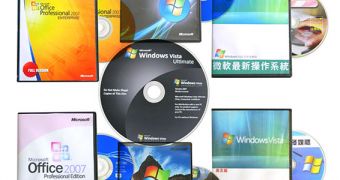Windows piracy is an international phenomenon with impact varying in accordance to the various markets across the globe. While statistics put together by the Business Software Alliance reveal that pirated software has a global rate of approximately 35%, an aspect also illustrative of Windows' situation, the truth is that the phenomenon in itself is less homogeneous. In this regard, Cori Hartje, director of Microsoft's Genuine Software Initiative, explained that in some countries, the piracy rate jumps in excess of 80%. Being one of the Microsoft's main cash cows together with the Office System, the Windows platform is also among the most pirated pieces of software in the world. Hartje exemplified some of the most common methods of producing and distributing counterfeit software.
"Sometimes, there is full packaged product, or "counterfeit" software, which means someone has taken the time to replicate the software and packaging for resale to unwitting customers. Probably one of the most familiar methods of piracy would be what is called peer-to-peer piracy, where users share software using CDs or via the Internet. Most people get SPAM e-mails that solicit the idea of making a "cheap" software purchase. Many of these offers should raise red flags for consumers. There also are unscrupulous resellers in the channel, such as system builders, that load unlicensed software onto computers and sell them," stated Cori Hartje, director of Microsoft's Genuine Software Initiative.
While the scenarios enumerated above refer mainly to end users, the phenomenon is not limited to them. Businesses and corporations worldwide are also running pirated software, Windows included. In order to help corporations access licensed Windows XP Professional and to scrap pirated copies of the operating system they might be using, Microsoft introduced the Get Genuine Windows Agreement program. End users do not benefit from a similar deal, although it would be a good idea for Microsoft to allow a more streamlined transition from pirated Windows to genuine products for all its customers. The worst of them, in terms of Windows piracy, from Microsoft's perspective are leaked Volume License Keys. It is a generalized Microsoft practice to issue volume license customers with a single key for multiple copies of the same Windows platform. The model backfired with Windows XP, and this is why with Vista Microsoft took it one step further and delivered Volume Activation 2.0.
"In the corporate customer space there is also what is referred to as "mislicensing," which involves misperceptions around the licensing rules in the Microsoft volume licensing agreements. Some of our commercial customers can unfortunately find their PCs unlicensed for the original Windows OS, believing that they can buy PCs without pre-installed Microsoft Windows and then use their volume licensing agreements to load the operating system, meaning they are not fully licensed. The regular volume licensing agreements like the Select Agreement or Enterprise Agreement have upgrades available for purchase, so there must be an eligible licensed copy of the Windows software already on the machine to be able to use the upgrade available in those programs", Hartje added.

 14 DAY TRIAL //
14 DAY TRIAL //